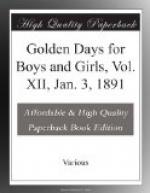“And he got up and stood thar, shakin’ his head and lookin’ as if a feather’d knock him down. And, says he, ’if this means anything at all, Ichabod, it means an awful lot! It means that Reuben Wallace was worth forty thousand dollars at the time of his death, and that that forty thousand dollars was invested with this New York coal merchant. Thar’s one thing fer us to do, Ichabod,’ says he, ’and that’s to write to this man in New York and see what’s the meanin’ of all this ’ere! That’s a simple thing, and I’ll do it,’ says he. ‘I’ll do it, this minute.’ And down he sot and begun to write; and when he’d got done with that air old letter, I put it back into my pocket ag’in.
“And,” pursued Ichabod, whose voice had grown shrill as ever, in excitement, “I come away and I set to lookin’ ye up, to tell ye every word Mr. Doolittle said—every word. And I’ve been pretty nigh all over the town, and was jest thinkin’ o’ startin’ up thar to the Browns, when I see ye.”
Ichabod mopped his face and head with his handkerchief.
Trudy stood still, in a dazed condition, which allowed her neither to move nor speak; but Mrs. Scott, who had listened with close attention, though finding it hard to understand a tale which, for her, had begun in the middle, asked, with practical interest:
“And what is the name of the coal merchant in whose hands this money is placed?”
“Angus Pritchard,” replied Ichabod, nodding his head several times.
He drew the letter from his pocket.
“Here ’tis, down to the bottom. Angus Pritchard, that’s what ’tis.”
“Angus Pritchard!” Mrs. Scott repeated, in a voice of utter amazement; and Rosalie stood now as stock still as Trudy. “Angus Pritchard is my husband’s uncle—yes, and a coal merchant in New York. And he is at the Bellevue Hotel at this moment!”
[TO BE CONTINUED.]
WORK AND PLAY.
by KARL WINSHIP.
“Have you watered Prince this evening, Roswell?” asked Mr. Hofford, as his sixteen-year-old son came into the room at supper time and dropped into his seat at the table.
“Yes, sir,” answered Roswell, sulkily.
“And brought in the wood and coal?”
“Yes, sir.”
“Then you may go to the village to-night.”
“I don’t want to go to the village.”
For the first time Mr. Hofford appeared to notice his son’s air of discontent, and he asked, kindly:
“What’s the matter, Roswell? Are you sick?”
“No; I’m just tired out, that’s all,” replied the boy, giving the table-leg a little kick.
“Tired, are you?”
“Yes, I am. I am worked to death.”
Mr. Hofford laughed pleasantly.
“You don’t look as if you were in danger of dying. And I don’t think you do more work than other boys of your age.”
“I don’t know about that,” rejoined Roswell, in a discontented voice; “but I know I’m working from morning to night. I have to attend to everything in the way of chores, until I’m so tired that I can’t read or study. And I never have any time for play.”




